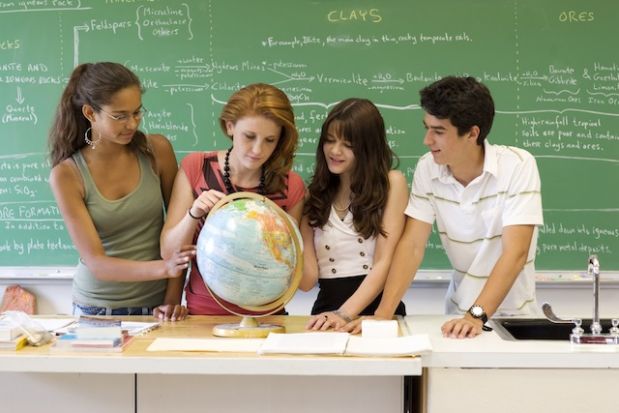Course Overview
 The Greek Educational System
The Greek Educational System
The educational system in Greece is mainly characterized by its versatile character, which
is ordained by the numerous laws and decrees of the Ministry of Education, Research and Religious Affairs. Over the years, the Ministry in question has made significant changes to the education system, most of which were mandated by the wish of each
government to adopt recent scientific findings and acclaimed education models of other countries in the world. Adapting state-of-the-art research in the field of education, as well as foreign education practices to meet the needs of the Greek society and labor market has resulted in a multilayered education system, which caters for all students in the
country. Most students in Greece attend public schools of all levels, for which there are no tuition fees, while less than 10% of the student population enrolls in private schools.
Early childhood education/care
AGE 0-4 Daycare center
AGE 4-6 (one year or pre-school education is compulsory) Kindergarten
Experimental Kindegartens exist
Elementary education
AGE 6-12 (COMPULSORY) Elementary school
Experimental Elementary Schools
Elementary Schools for Special Education,
Elementary Schools for the Deaf do exist(SPECIAL EDUCATION)
Secondary education
AGE 12-15 (COMPULSORY)
Junior High school
(Evening Junior High School, Experimental Junior High School, Music Junior High School,
Arts Junior High School, Multicultural Junior High School)
SPECIAL EDUCATION
Junior High School for students with Special Needs
AGE 15-18
General High school
(General Evening High School, Experimental High School, Music High School
Arts High School, Multicultural High School)
SPECIAL EDUCATION
Special Vocational Education & Training Institutes
VOCATIONAL EDUCATION
Vocational High School
Vocational Evening High School
Vocational Training Schools
18+
University
Technological Educational Institute
School of Pedagogical and Technological education
School of Fine Arts
Hellenic Open University
Lifelong Learning
Lifelong Learning Centers
Second Chance Adult Education School
VOCATIONAL EDUCATION
Vocational Training Schools
Vocational Training Institutes
Also
Military Schools,Police Academy, Drama Schools, Colleges (private ones that collaborate with
non-Greek EU and US Universities under licenses)
Structure of the Greek Education System
Education in Greece is compulsory for all students aged 5-15 y. old” (1 year Pre-School, 6 years Elementary Edu and 3 years Junior High School, 10 years of compulsory education.
The education system is divided into Early Education and Care for children up to the age of 6;
Primary Education for schoolchildren between the ages of 6 and 12, Secondary Education
for teenagers between the ages of 12 and 18, Higher Education for those wishing to
attend university courses, and, finally, Lifelong Learning, which caters for adult students of
all ages.
Early Education and Care
In Greece there are Daycare Centers which provide children up to the age of 5 with preschool
education. The last stage of pre-school education is carried out in Kindergarten
Schools, where young students take preparatory courses just before enrolling in
primary/elementary schools.
Primary Education
Primary Schools welcome children of the age of 6. Some of these schools are termed
“Experimental”, as they carry out experimental education practices, and are supervised by
university departments specializing in pedagogic and primary education. There are also
primary schools which cater for students with physical or mental impairment, or special
needs. In all three types of primary schools, students learn basic skills in a number of
subjects, like Language Reading and Writing, Environmental Studies, Maths, English.
Primary Schools in Greece operate between 8am and 1pm, while the majority of those
offer extra classes on Physical Education, Art and Music until 4pm.
Secondary Education
All students graduating from primary education must attend courses in a Junior High
School (Gymnasium- age 12-15) and high school (Lyseum-Age 15-18). There are several types of Junior High Schools. A student may attend the Junior High School which is located in his neighborhood, or he/she may be admitted to an Experimental Junior High School through a lottery system. Students who have a special interest in painting, drama, dancing or music may attend a Junior High School that
specializes in the field.
There are also Junior High Schools which address students from a multicultural background, as well as students with special needs. Most Junior High Schools operate from 8am to 2pm, but there are also evening schools that operate from 7pm till 10pm for students – mainly adults – who work during daytime. A variety of subjects are taught in Junior High Schools, including Modern and Ancient Greek
Language, Maths, Physics, Chemistry, Geography, History, Physical Education, Religious
Studies, Music and Art, while special emphasis is given to foreign language learning, as
students are taught both English and another European language of their choice (students
tend to choose between French and German). Students take exams in all subjects at the
end of each school year.
Although upper level Secondary Education is not compulsory in Greece, most students
attend High School. At this level, students may opt to attend a General High School or an
Experimental High School (mainly for graduates of Experimental Junior High Schools) or
any High School specializing in music or the arts. Students coming from a different cultural/lingual backround may attend a Multicultural Elementary or High School, while there are Special Vocational Education & Training Institutes for students with special needs. Students may also pursue vocational
training in Vocational High Schools, or, once they are 16, they may enroll in a Vocational
Evening High School and graduate after 4 years of study. In addition, there are Vocational
Training Schools; in these schools, as well as in all Vocational High Schools students
attend general education courses combined with workplace courses. At the final stage of
his/her studies, a student may work as an apprentice and gain valuable work experience.
High Schools offer a combination of General Education courses and Advanced Placement
courses. Students who wish to pursue studies in Higher Education take Panhellenic
exams in a specific number of Advanced Placement courses which fall into one of the
following categories: Humanities, Science, Technology. This is considered to be a tough
and highly competitive exam process that students go through in order to ensure
education at a higher level.
Higher Education (Post secondary education)
Greece has a high number of university graduates. Most of them attend four-year studies
in University departments and in Technological University departments, as well as in the
various departments of the School of Pedagogical and Technological Education, while
those attending Technical University departments – specializing in fields like architecture
and engineering – graduate after five years of studies. Students who wish to enroll in the
School of Fine Arts take special exams, and graduate after five years of studies. Courses
in Higher Education institutes in Greece take the form of either lectures or workshops, and
most of the courses spread over one semester. Most university departments in Greece
offer one-year or two-year postgraduate courses, as well as the opportunity to pursue a
doctoral degree. Students may also enroll in the Hellenic Open University for graduate or
postgraduate studies, where they pay tuition fees and where they are admitted through an
annual lottery system.
Lifelong Learning
Lifelong Learning in Greece takes place in Lifelong Learning centers which are usually
supervised by Municipality services. These centers offer a variety of courses, aiming at
both formal and informal education. On the other hand, Vocational Training Institutes and
Vocational Training Schools often adapt their curriculum to suit the needs of their adult
students and of the labor market. Finally, Second Chance Adult Education Schools cater
for those students who have dropped out of school at some point in their life, but wish to
continue with their studies at a later date.
Course Curriculum
-
Other Curriculum Issues
Students Enrolled
0.00 average base on 0 ratings


 SmartOWL
SmartOWL